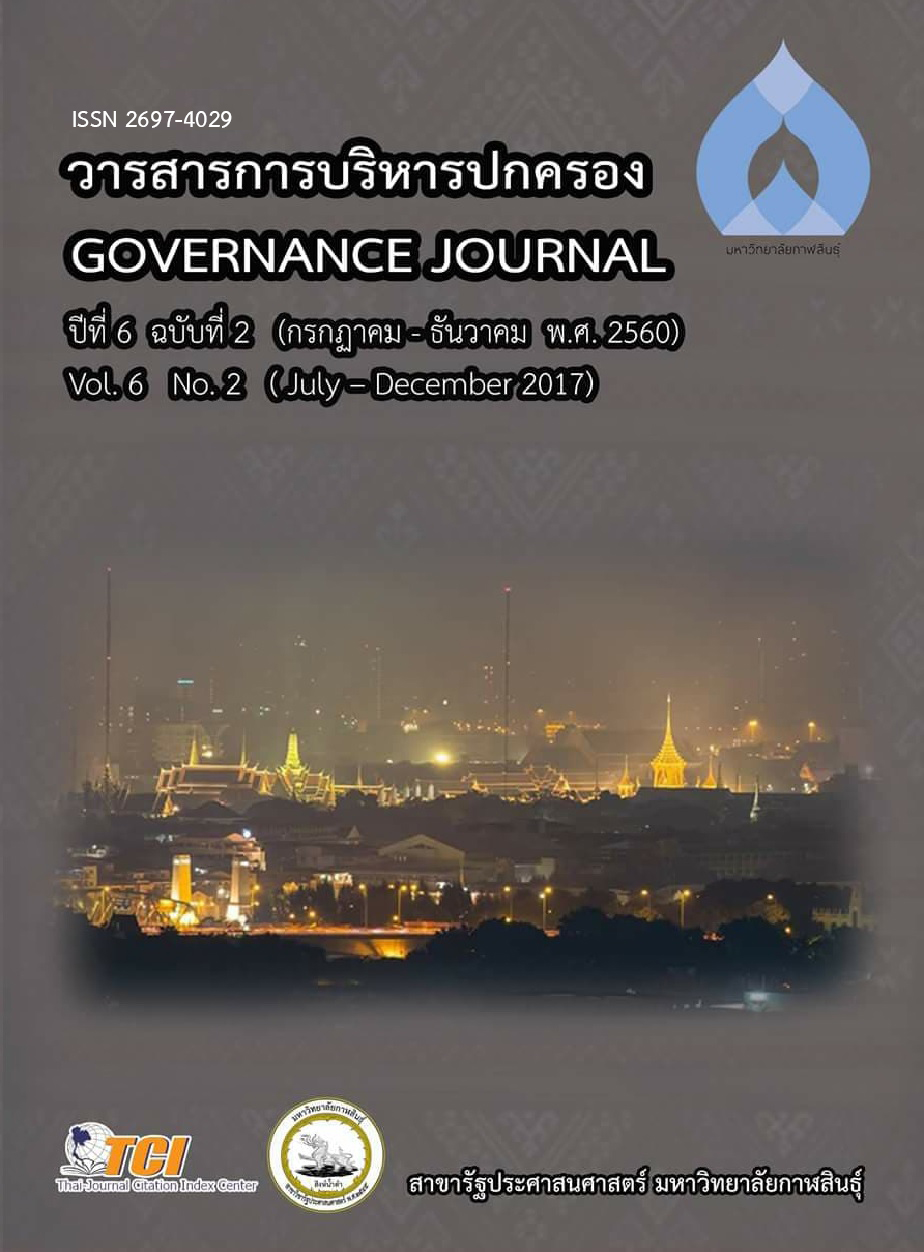การบริหารโรงเรียนสิ่งแวดล้อมศึกษาที่มุ่งผลลัพธ์การเรียนรู้สู่การพัฒนาอย่างยั่งยืน
DOI:
https://doi.org/10.14456/gjl.2017.39คำสำคัญ:
โรงเรียนสิ่งแวดล้อม;การเรียนรู้;การพัฒนาอย่างยั่งยืนบทคัดย่อ
การวิจัยนี้มีวัตถุประสงค์เพื่อ 1) วิเคราะห์สภาพปัจจุบันและสภาพที่พึงประสงค์ของการบริหารโรงเรียนสิ่งแวดล้อมศึกษาที่มุ่งผลลัพธ์การเรียนรู้สู่การพัฒนาอย่างยั่งยืน 2) เพื่อศึกษา จุดแข็ง จุดอ่อน โอกาสและภาวะคุกคามของการบริหารโรงเรียนสิ่งแวดล้อมศึกษาที่มุ่งผลลัพธ์การเรียนรู้สู่การพัฒนาอย่างยั่งยืน โดยใช้วิธีวิจัยแบบผสม ประเมินเครื่องมือการวิจัยโดยผู้ทรงคุณวุฒิ จำนวน 5 คน ประชากรที่ศึกษา คือ โรงเรียนสิ่งแวดล้อมศึกษา จำนวน 91 โรงเรียน ผู้ให้ข้อมูล ได้แก่ ผู้บริหารและครู เครื่องมือที่ใช้ในการเก็บข้อมูล คือ แบบประเมิน แบบสอบถาม วิเคราะห์ข้อมูลโดยใช้สถิติเชิงบรรยาย ได้แก่ ความถี่ ร้อยละ ค่าเฉลี่ย และส่วนเบี่ยงเบนมาตรฐาน ผลการวิจัยพบว่า สภาพปัจจุบันของการบริหารโรงเรียนสิ่งแวดล้อมศึกษาที่มุ่งผลลัพธ์การเรียนรู้สู่การพัฒนาอย่างยั่งยืน มีค่าเฉลี่ยอยู่ในระดับปานกลาง สภาพที่พึงประสงค์ของการบริหารโรงเรียนสิ่งแวดล้อมศึกษาที่มุ่งผลลัพธ์การเรียนรู้สู่การพัฒนาอย่างยั่งยืน มีค่าเฉลี่ยอยู่ในระดับมาก และมีค่าเฉลี่ยสภาพที่พึงประสงค์สูงกว่าสภาพปัจจุบันทุกด้าน จุดแข็ง ได้แก่ การจัดกระบวนการเรียนรู้ การมีส่วนร่วมและเครือข่ายด้านสิ่งแวดล้อมศึกษา จุดอ่อน ได้แก่ นโยบายสิ่งแวดล้อมศึกษาและโครงสร้างบริหารจัดการ การจัดการทรัพยากรธรรมชาติและสิ่งแวดล้อม โอกาส ได้แก่ ด้านการเมืองและนโยบายของรัฐ และด้านเทคโนโลยี อุปสรรค ได้แก่ ด้านเศรษฐกิจ และสังคม
Downloads
เอกสารอ้างอิง
ยั่งยืน : กรณีศึกษาป่าชุมชนในจังหวัดอุบลราชธานี, วารสารการบริหารปกครอง, 4 (1) : 141 – 157
คณะกรรมการพัฒนาการเศรษฐกิจและสังคมแห่งชาติ. สำนักงาน. (2554).
แผนพัฒนาเศรษฐกิจและสังคมแห่งชาติ ฉบับที่ 11 (พ.ศ. 2555-2559). กรุงเทพ: สำนักงานคณะกรรมการพัฒนาการเศรษฐกิจและสังคมแห่งชาติ.
พฤทธิ์ ศิริบรรณพิทักษ์. (2553). การจัดการศึกษาเพื่อการพัฒนาที่ยั่งยืน:
พื้นฐานการศึกษาด้านเศรษฐกิจ สังคมและสิ่งแวดล้อม. กรุงเทพฯ:
โรงพิมพ์ไทยสัมพันธ์.
วรรณภา นิติมลคงชัยและเพ็ญแข ธรรมเสนานุภาพ. (2553). อนาคตภาพ
แนวทางการดำเนินงานสิ่งแวดล้อมศึกษาของไทย ในทศวรรษหน้า (พ.ศ.2550-2559). AEE - T Journal of Environmental Education, 1 (2) :183-201.
ศาลรัฐธรรมนูญ. สำนักงาน. (2550). รัฐธรรมนูญแห่งราชอาณาจักรไทย พ.ศ.
2550.(Online), สืบจาก http://www.ombudsman.go.th/10/ documents/law/constitution2550.pdf, เมื่อ 25 กุมภาพันธ์ 2555.
ศิริชัย กาญจนวาสี. 2552. ทฤษฎีการทดสอบแบบบดั้งเดิม. พิมพ์ครั้งที่ 6.
กรุงเทพ: โรงพิมพ์แห่งจุฬาลงกรณ์มหาวิทยาลัย.
ศึกษาธิการ. กระทรวง. กองวิจัยทางการศึกษา กรมวิชาการ. (2555). การ
สังเคราะห์การจัดการเรียนการสอนเกี่ยวกับการอนุรักษ์พัฒนาสิ่งแวดล้อม. (Online), สืบค้นจาก http://www.thaiedresearch.org/thaied/index. php.,เมื่อ 25 กุมภาพันธ์ 2555.
Ontario Learning for Sustainability Partnership (OLSP). (1996). Learning
for Sustainability: Essential Outcomes and Classroom Learning Strategies. Toronto: OLSP.
UNESCO. (1997). Education for a Sustainable Future: A Trans
disciplinary Vision for Concerted Action. Paris: UNESCO.
UNESCO. (2005). Working Paper: Asia-Asia-Pacific Regional Strategy
for Education for Sustainable Development. 2nd ed. Bangkok: UNESCO (Bangkok Compus).
UNESCO. (2013). UN Decade of Education for Sustainable
Development. (Online), Retrieved from http://unesdoc.unesco .org/ images/0015/001540/154093e.pdf, February 25, 2013.
Yamane, T. (1976). Statistic: An introductory Analysis. 3rd ed.
New York: Harper and Raw Publication.1976.
Translated Thai References
Kanjanawasee, S. (2009). Evaluation Theory. Bangkok. Chulalongkorn
Print Publishing.
Kumsap, K. (2005). Community Rights and Sustainable Natural
Resources Management : A Case Study of Community Forest in Ubon Ratchathani Province, Governance Journal, 4 (1) : 141 - 157
Ministry of Education. Educational Research Division, Department of
Academic. (2012). An Analysis of Teaching and Learning in
Environmental Conservation. (Online), Retrieved from http://www.thaiedresearch.org/thaied/index. Php, February 25, 2012.
Nitimongkolchai, W. and Penkhae, T. (2013). Comparision between
futuristic scenario trend of working guildelines on environmental education in Thailand in next decade and international level (2007 - 2016), AEE – T Journal of Environmental Education. 1 (2) : 183-201.
Office of the Constitional Court. (2012). Constitution of the Kingdom
of Thailand BE 2550. (Online), Retrieved from http://www.ombudsman.go.th/10/documents/law/constitution 2550.pdf, February 25, 2012.
Office of the National Economic and Social Development Board.
(2011). The Eleventh National Economic and Social Development Plan (2012-2016). Bangkok : Office of the National Economic and Social Development Board..
Siribanpitak, P. (2010). Education for Sustainable Development:
The basic in economy, society and environment. Bangkok: Thaisampun Print Publishing.
ดาวน์โหลด
เผยแพร่แล้ว
รูปแบบการอ้างอิง
ฉบับ
ประเภทบทความ
สัญญาอนุญาต

อนุญาตภายใต้เงื่อนไข Creative Commons Attribution-NonCommercial-NoDerivatives 4.0 International License.








